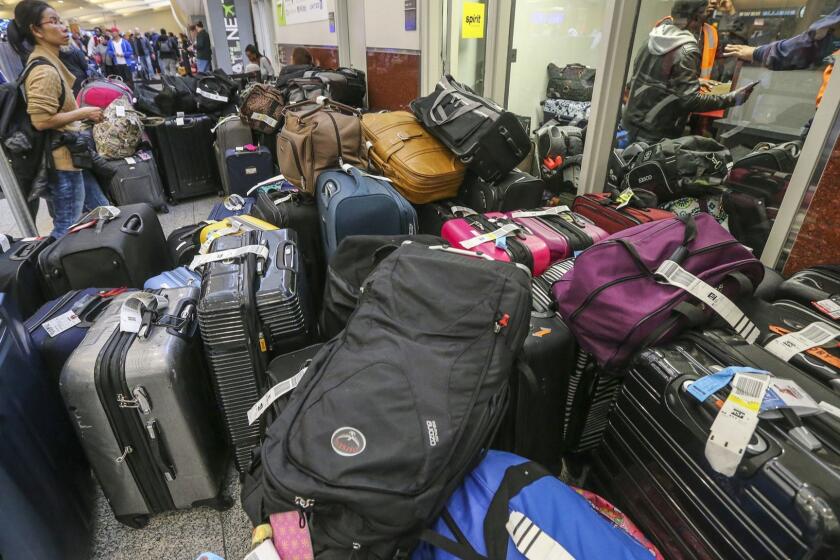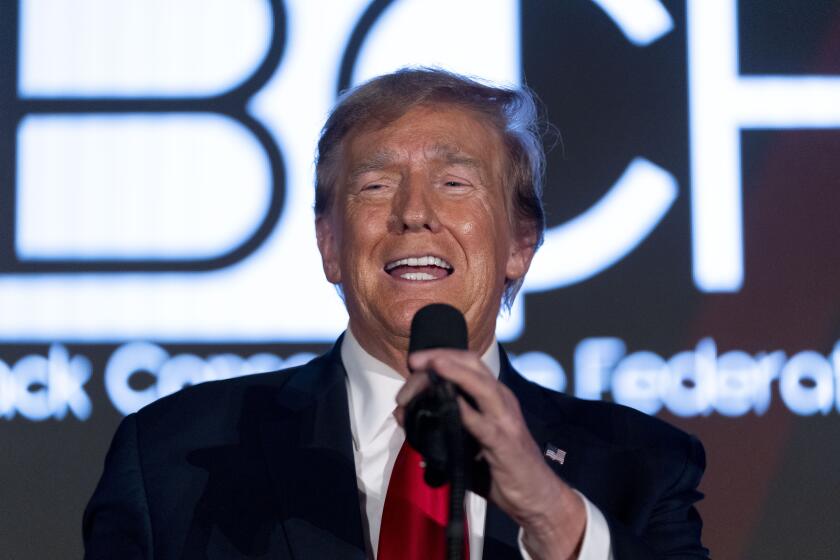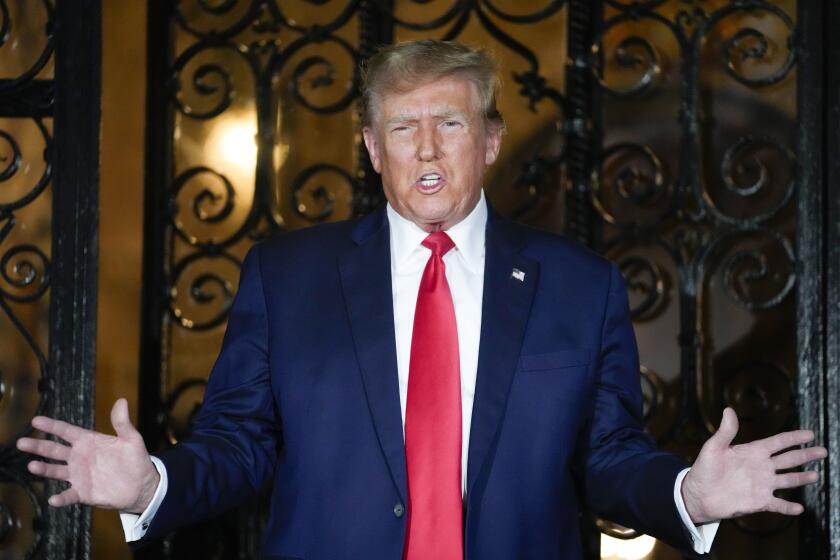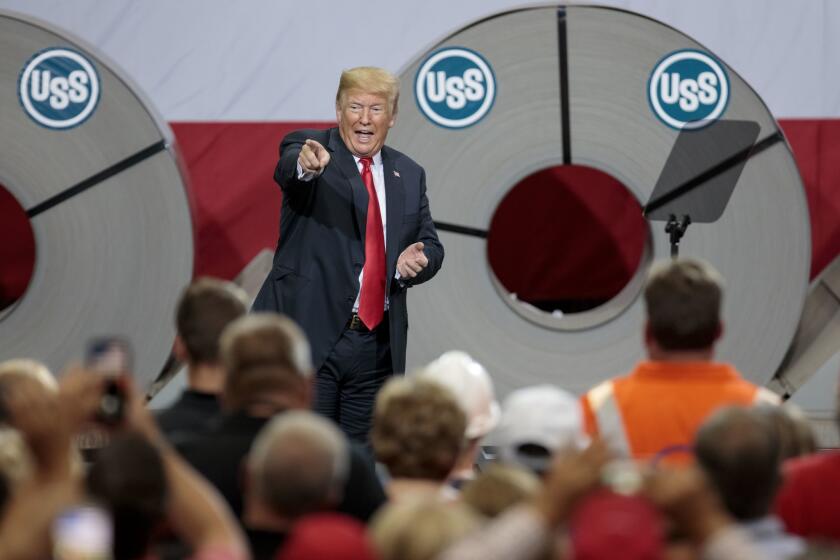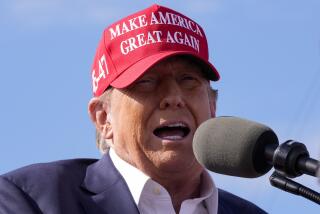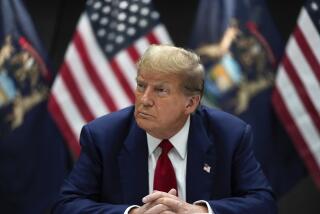Column: Trumponomics? He would impose the equivalent of a huge tax hike
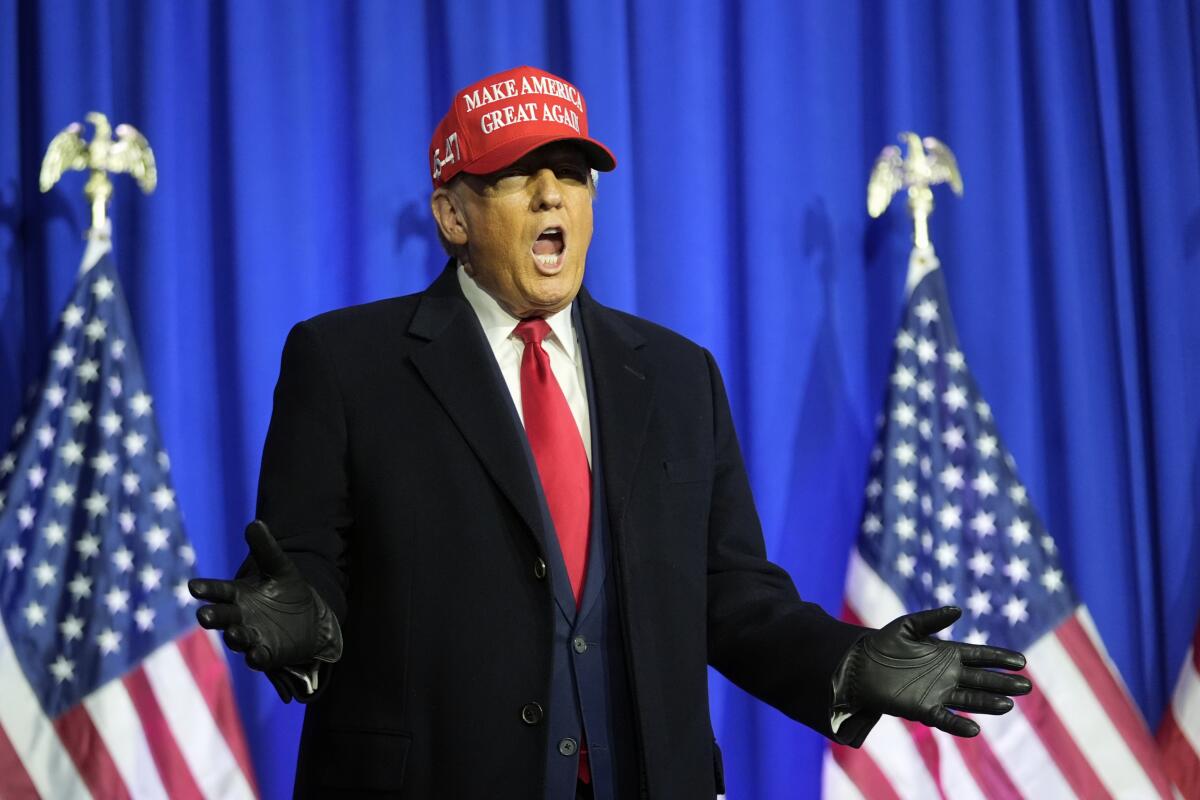
If Donald Trump becomes president again, one of his first moves will take money out of your pocket just as a tax hike would.
Trump hasn’t outlined much of an economic program, but he has promised to impose a massive increase in tariffs on imports from almost all foreign countries — everything from bananas and baby formula to computer chips and machine parts.
And that’s the equivalent of a tax hike, because the costs of tariffs are paid almost entirely by the buyers of imported goods, whether they are Walmart shoppers or U.S. businesses that rely on foreign components.
Trump boasts that the tariffs he imposed in 2018 and 2019 brought billions of dollars into the Treasury, and promises a similar revenue increase in a second term. “The United States will make an absolute FORTUNE,” his campaign website says.
Here’s the problem: Contrary to what the former president seems to think, tariffs aren’t paid by foreign companies or governments. They’re initially paid by the U.S. companies that import the goods, but those importers almost always pass the cost on to consumers in the form of higher prices.
President Trump has repeatedly proclaimed that when it comes to tariffs on Chinese goods, China pays the price.
This time, Trump is proposing a “universal” tariff of 10% on goods from every country in the world. He has also mused about megatariffs of more than 60% that he wants to slap on China in hopes of forcing Beijing to lower its tariffs and treat U.S. companies fairly.
Economists say that either of those proposed tariffs would produce price increases and push inflation upward.
That’s why traditional free-trade Republicans like Nikki Haley and Mike Pence think Trump’s proposal is a bad idea, as does almost every practicing economist.
“It’s lunacy,” said Adam Posen, president of the Peterson Institute for International Economics.
But wait — there’s more.
Former President Trump claims his many criminal indictments boost his support among Black Americans because they see him as a victim of discrimination.
Those increased costs would hit low-income people hardest, because they spend a larger share of their income on goods.
“If baby formula goes up 25%, low-income earners will feel it more than people on Wall Street,” Posen said. “The burden of the tax falls disproportionately on poor people.”
And when the United States imposes tariffs, the targeted country almost always reciprocates.
“They’re not just going to roll over,” Posen said. “And they’re going to be strategic; they’ll pick industries where the U.S. will lose huge market share, because the retaliatory tariffs will drive the price of American products up.”
Those who remember the chaos of the Trump presidency may find it hard to believe, but a majority of voters see him as the candidate of stability. GOP moves on abortion could change that.
We have recent experience with all of these problems, thanks to Trump’s earlier tariffs. Take California almonds, the state’s most valuable export crop.
Until 2018, China bought almost all its almonds from California. But after Trump slapped tariffs on a range of Chinese products that year, China retaliated with tariffs on U.S. agricultural exports, including nuts.
California almond sales plummeted, and Australian growers rushed in to fill the gap. In a report for the Giannini Foundation of Agricultural Economics at UC Davis, economists Sandro Steinbach and Colin A. Carter calculated that the episode cost the state’s almond growers about $875 million in lost income.
Other U.S. exporters to China, from soybean farmers to truck manufacturers, took similar hits.
Those costs might have been tolerable if the tariffs had accomplished their main goal, which was to protect and promote manufacturing jobs in the United States.
But they didn’t. A slew of economic studies found that Trump’s tariffs had little or no positive effect on the industries they were designed to protect — and that the negative consequences for the economy resulted in a net loss of jobs.
“Import tariffs on foreign goods neither raised nor lowered U.S. employment in newly-protected sectors,” a team of economists led by David Autor of MIT reported last month.
For example, Trump wanted to protect steel industry jobs from foreign competition, but his tariffs on foreign-made steel didn’t help much. By the end of his presidency in 2021, the steel industry had lost several thousand jobs.
Trump’s tariffs caused a temporary lift for the U.S. steel industry, but now its future looks bleaker, with falling prices, oversupply and layoffs.
Meanwhile, those tariffs hurt the more numerous jobs in industries that buy foreign-made steel, including automakers and appliance manufacturers.
“For every one steel-producing job, we have about 80 steel-consuming jobs,” Erica York of the conservative-leaning Tax Foundation noted. “All those industries got hit by higher costs, and many of them lost jobs ” — about 75,000 total positions, according to one study.
But Trump’s tariffs had an important side effect, Autor and his colleagues reported.
“Despite the trade war’s failure to generate substantial job gains, it appears to have benefited the Republican Party” in the Rust Belt, the economists wrote.
Trump “may have garnered support from voters who were skeptical about the favorable economic consequences of tariffs, but who appreciated [his] intention to confront Chinese competition and protect U.S. jobs,” they wrote.
Trump has long described himself as a “Tariff Man” — convinced, in his words, that protectionism “will always be the best way to max out our economic power.”
He’s wrong about that.
The new tariffs he’s proposed won’t save the economy. But they may help Trump win industrial states like Pennsylvania, Ohio, Michigan and Wisconsin — and that may have been the point all along.
More to Read
Get the L.A. Times Politics newsletter
Deeply reported insights into legislation, politics and policy from Sacramento, Washington and beyond. In your inbox three times per week.
You may occasionally receive promotional content from the Los Angeles Times.
